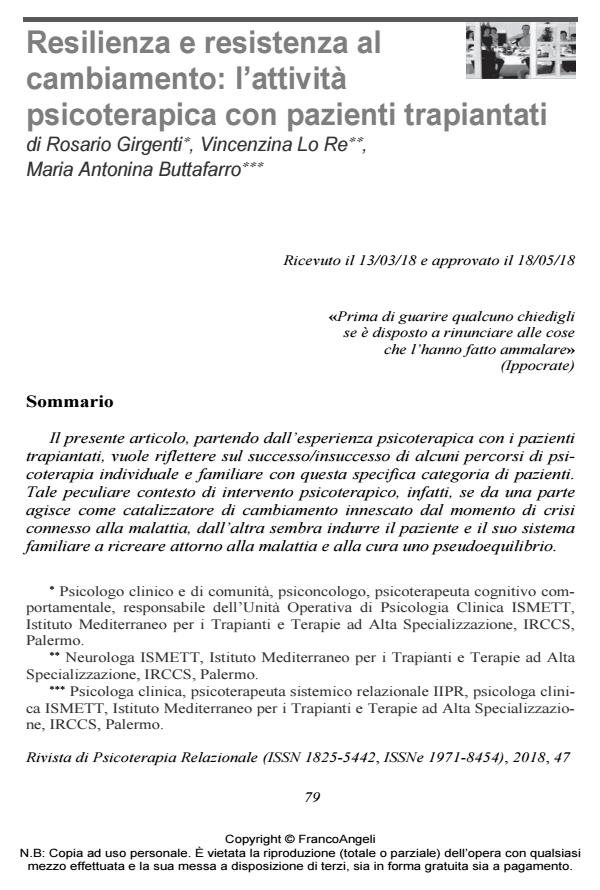Resilience and resistance to change: psychotherapy with transplant patients
Journal title RIVISTA DI PSICOTERAPIA RELAZIONALE
Author/s Rosario Girgenti, Vincenzina Lo Re, Maria Antonina Buttafarro
Publishing Year 2018 Issue 2018/47
Language Italian Pages 15 P. 79-93 File size 311 KB
DOI 10.3280/PR2018-047006
DOI is like a bar code for intellectual property: to have more infomation
click here
Below, you can see the article first page
If you want to buy this article in PDF format, you can do it, following the instructions to buy download credits

FrancoAngeli is member of Publishers International Linking Association, Inc (PILA), a not-for-profit association which run the CrossRef service enabling links to and from online scholarly content.
This article, starting from the psychotherapeutic experience with transplant patients, explores the success or failure of some individual and family psychotherapies with this specific category of patients. This peculiar context of psychotherapy, if, on one hand, acts as a catalyst of change triggered by the period of crisis associated with the disease, on the other hand it seems to induce patients and their families to recreate a pseudobalance around the disease and treatments. The emotional wave evoked by the disease seems to be able to create a movement functional to the family’s adjustment to the paranormative event, determining also the resolution of psychological disorders and symptoms initially classified as reactive at the onset of the organic pathology. The clinical experience in this field, however, leads us to think that this change and/or growth, during the care path of these patients, undergoes a block/relapse that brings the psychological symptomatology back when the clinical emergency ceases. This makes us wonder to what extent the reactive efforts of an individual or family, when it comes to illness, can be defined as resilience, and to what extent their failure can be defined as resistance to change.
Keywords: Resilience, reactive disorders, transplant, resistance to change.
- Connor K.M., Davidson J.R.T. (2003). Development of a new resilience scale: The Connor-Davidson resilience scale (CDRISC). Depression and anxiety, 18: 76-82.
- Aponte H.A., Van Deusen J.M (1981). Structural family Therapy. In Giusti E., Barbuto F. (2014). Cambiamento e Resistenza in Terapia: l’aderenza veloce al trattamento, Sovera Edizioni.
- Di Martini A., Crone C., Fireman M., Dew M. (2017). Psychiatric aspects of organ transplantation in critical care. Critical care clinics, 33(3): 949-81.
- Loriedo C. (2005). Bambini sintomatici: le funzioni del sintomo del bambino e dell’adolescente all’interno del sistema familiare. In Bogliolo C. e Loriedo C. (a cura di), Famiglie e psicopatologia infantile. FrancoAngeli: Milano.
- Loriedo C. (2005). Resilienza e fattori di protezione nella psicoterapia familiare sistemica. Rivista di psicoterapia relazionale, 21: 5-28. DOI: 10.1400/7037
- Loriedo C., Picardi A. (2000). Dalla teoria generale dei sistemi alla teoria dell’attaccamento. Percorsi e modelli della psicoterapia sistemico-relazionale. FrancoAngeli: Milano.
- Minuchin S. (1977). Famiglie e terapia della famiglia. Astrolabio: Roma.
- Vito A. (2014). Psicologi in ospedale. Percorsi operativi per la cura globale di persone. FrancoAngeli: Roma.
- Walsh, F. (2008). La resilienza familiare. Raffaello Cortina: Milano.
Rosario Girgenti, Vincenzina Lo Re, Maria Antonina Buttafarro, Resilienza e resistenza al cambiamento: l’attività psicoterapica con pazienti trapiantati in "RIVISTA DI PSICOTERAPIA RELAZIONALE " 47/2018, pp 79-93, DOI: 10.3280/PR2018-047006